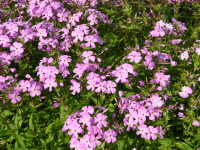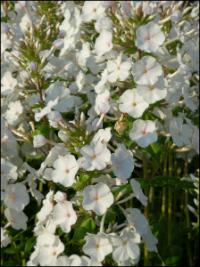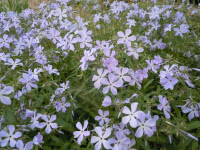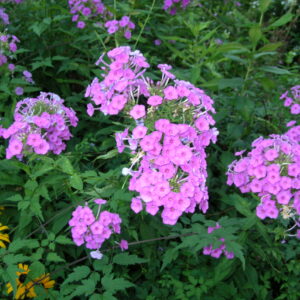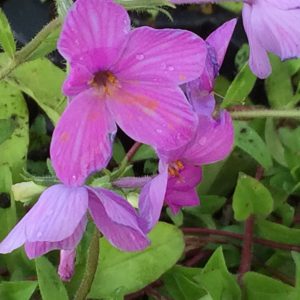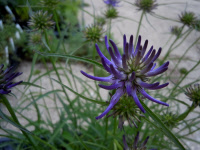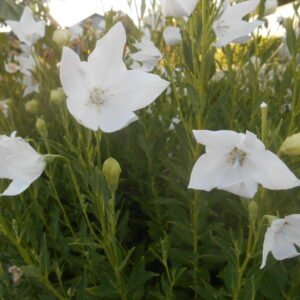Our Plants
Showing 425–432 of 587 results
-
Phlox buckleyi Sword leaf Phlox Z 4-8
Sprays of mauve, pink or purple in May-June
OUT OF STOCK
Sprays of mauve, pink or purple in May-June
Size: 8- 18” x 12”
Care: sun to part shade in any soil
Native: Virginia & West VirginiaBob from Texas reports “they are absolutely the most fragrant flowers we have ever experienced. We only pick a few each spring and put them in a vase in the house with sugar sweetened water. They produce that amazing fragrance in the house for virtually two full weeks in that vase while the rest put that aroma across the back yard. Sword Leaf Phlox is simply an amazingly beautiful plant.”
Described and named by Edgar Theodore Wherry (1885-1982), unflagging naturalist in the finest tradition of wide interests in the natural world. After getting his Ph.D. in 1909 in geology-mineralogy he became Asst. Curator of Minerals for the Smithsonian. In 8 years he transferred to the USDA Bureau of Chemistry, becoming its principal chemist. In 1930 he was appointed botany professor at U. Penn., where he taught botany and ecology for 25 years.**LISTED AS OUT OF STOCK BECAUSE WE DO NOT SHIP THIS ITEM. IT IS AVAILABLE FOR PURCHASE AT OUR RETAIL LOCATION.
-
Phlox carolina ‘Miss Lingard’ Carolina phlox, Wedding phlox Z 5-8
True to its common name this 3’ tall selection bears bridal white blossoms with pink eyes late June into August with deadheading.
True to its common name this 3’ tall selection bears bridal white blossoms with pink eyes late June into August with deadheading.
Size: 3-4' x 18"
Care: sun to part shade in moist to moist well-drained soil. Powdery mildew resistant
Native: Cultivar of native in eastern and central U.S.
Wildlife Value: attracts butterflies and hummingbirdsPhlox is Greek meaning “flame.” The species carolina in gardens before 1889 and cultivar ‘Miss Lingard’ before 1905.
-
Phlox divaricata Wild sweet William Z 3-8
Bright lavender flowers, tubes opening to five flat, paddle-shaped lobes, welcome spring. One of internationally known garden designer Piet Oudolf’s 100 “MUST HAVE” plants, Gardens Illustrated 94 (2013)
Bright lavender flowers, tubes opening to five flat, paddle-shaped lobes, welcome spring. One of internationally known garden designer Piet Oudolf’s 100 “MUST HAVE” plants, Gardens Illustrated 94 (2013)
Size: 12" x 10"
Care: part shade in moist, well-drained soil.
Native: Canada to New England, Wisconsin
Wildlife Value: pollinated by Tiger swallowtail butterflies, hummingbirds, bumblebees and others while they reach the flower’s nectar
Awards: Received England’s Royal Horticultural Society Award of Merit.Phlox is Greek meaning “flame.” 1st introduced to gardens by John Bartram around 1746. Recommended by Gertrude Jekyll, mother of mixed perennial borders, in 1908.
-
Phlox paniculata Garden phlox Z 4-8
Many small, tube-shaped flowers opening to five flat petals join together in a dome-shaped, fragrant, magenta 6-8” cluster at the end of each branch, blooming from July to September. The classic farm garden flower. Deadhead for rebloom.
Many small, tube-shaped flowers opening to five flat petals join together in a dome-shaped, fragrant, magenta 6-8” cluster at the end of each branch, blooming from July to September. The classic farm garden flower. Deadhead for rebloom.
Size: 4' x 2' spreader and self-seeder
Care: full sun to part shade in moist or moist well-drained soil.
Native: Pennsylvania west to Arkansas and Missouri. South to Alabama.
Wildlife Value: Silvery checkerspot, European cabbage, and Blue, Black & Spicebush swallowtails butterflies relish Phlox’s nectar. Deer and Walnut resistant.Phlox is Greek meaning flame. One of the 1st plants collected in No. America – grown in Tradescant the Elder’s South Lambeth (now a borough of South London) nursery in 1634. Offered for sale in Bartram Garden’s 1783 Broadside, America’s 1st plant catalog.
-
Phlox stolonifera syn. P. reptans Creeping phlox Z. 5-9
Carpet of purple tube-shaped flowers at the stem, opening to flat petals, each with a notch on the end. It blooms from mid-spring into early summer.
OUT OF STOCK
Carpet of purple tube-shaped flowers at the stem, opening to flat petals, each with a notch on the end. It blooms from mid-spring into early summer.
Size: 6-10” x spreads by stolons (stems that root on soil surface, hence the name "stolonifera.")
Care: shade to part-shade in moist well-drained, mildly acidic soil
Native: Appalachian Mountains’s Appalachian foothills. Maine to Georgia, west to Ohio
Wildlife Value: Deer and rabbit resistant. Attracts butterflies and bees.Discovered by Scottish botanist John Fraser (1750-1811) in Georgia 1786 and sent to Curtis’s Botanical Magazine in 1801. Also collected by French botanist Andre Michaux about same time.
(Do not confuse this Phlox stolonifera with Phlox subulata – with the same common name of Creeping phlox- that blooms earlier in spring, is about 4” taller and grows in sun, not shade.) -
Phyteuma scheuchzeri Horned rampion Z 5-8
Clusters of globe-shaped, blue-purple flowers with petals resembling tiny horns or curved spikes bloom in June-July. “…(W)hen exposed only to the morning sun, will keep long in bloom.” Curtis’ Botanical Magazine 1815-6.
Clusters of globe-shaped, blue-purple flowers with petals resembling tiny horns or curved spikes bloom in June-July. “…(W)hen exposed only to the morning sun, will keep long in bloom.” Curtis’ Botanical Magazine 1815-6.
Size: 8-12” x 12”
Care: sun in well-drained soil
Native: Mountains of Switzerland and “Piemont.”Collected in late 1700’s. The name Phyteuma is from Greek meaning “a plant.”
-
Pimpinella major ‘Rosea’ Greater burnet, Cow parsley Z 5-8
Like Queen Ann’s lace but fear its invasion? Here’s a look-alike, pink perennial that won’t take over. Its many upright stems, with lacy foliage, each support a pink umbel. Blooms in early to mid-summer.
Like Queen Ann’s lace but fear its invasion? Here’s a look-alike, pink perennial that won’t take over. Its many upright stems, with lacy foliage, each support a pink umbel. Blooms in early to mid-summer.
Size: 3’-4’ x 2’
Care: sun to part-shade in moist well-drained soil
Native: Europe and Caucasus
Wildlife Value: attracts bees and butterflies. Its flowers are rich in both pollen and nectar.First described in literature in 1812 by German botanist David Heinrich (1760-1846) in Nouvelle Flore des Environs de Paris. He named it Pimpinella rubra. Since then botanists decided it’s a cultivar of the white-flowered Pimpinellla major and renamed it.
-
Platycodon grandiflorus albus Balloon flower Z 3-9
Balloon shaped buds as though puffed with air, open to white, five-petal bells from mid-summer to early fall.
Balloon shaped buds as though puffed with air, open to white, five-petal bells from mid-summer to early fall.
Size: 24" x 12"
Care: Sun to part shade in moist well-drained soil, heat and drought tolerant. Deadhead for rebloom.
Native: Eastern Asia
Wildlife Value: attracts hummingbirds, bees & butterflies
Awards: England's Royal Horticultural Society Award of Garden Merit.Platycodon is Greek from platys meaning “broad” and kodon meaning “bell”, referring to the shape of the flower. Cultivated in China for hundreds of years where it is called Jie-geng. The Chinese used the root boiled to cure a chill in the stomach. Mentioned in Man’yoshu, a Japanese anthology of poems written in the 8th century. German botanist Johann Gmelin first collected this in Siberia in 1754. Gmelin’s Siberian mission, sponsored by Catherine the Great, took 10 years and nearly killed him. Gmelin introduced it to European gardens by 1782. Robert Fortune found the white form in a nursery near Shanghai and sent it to England in 1845.

